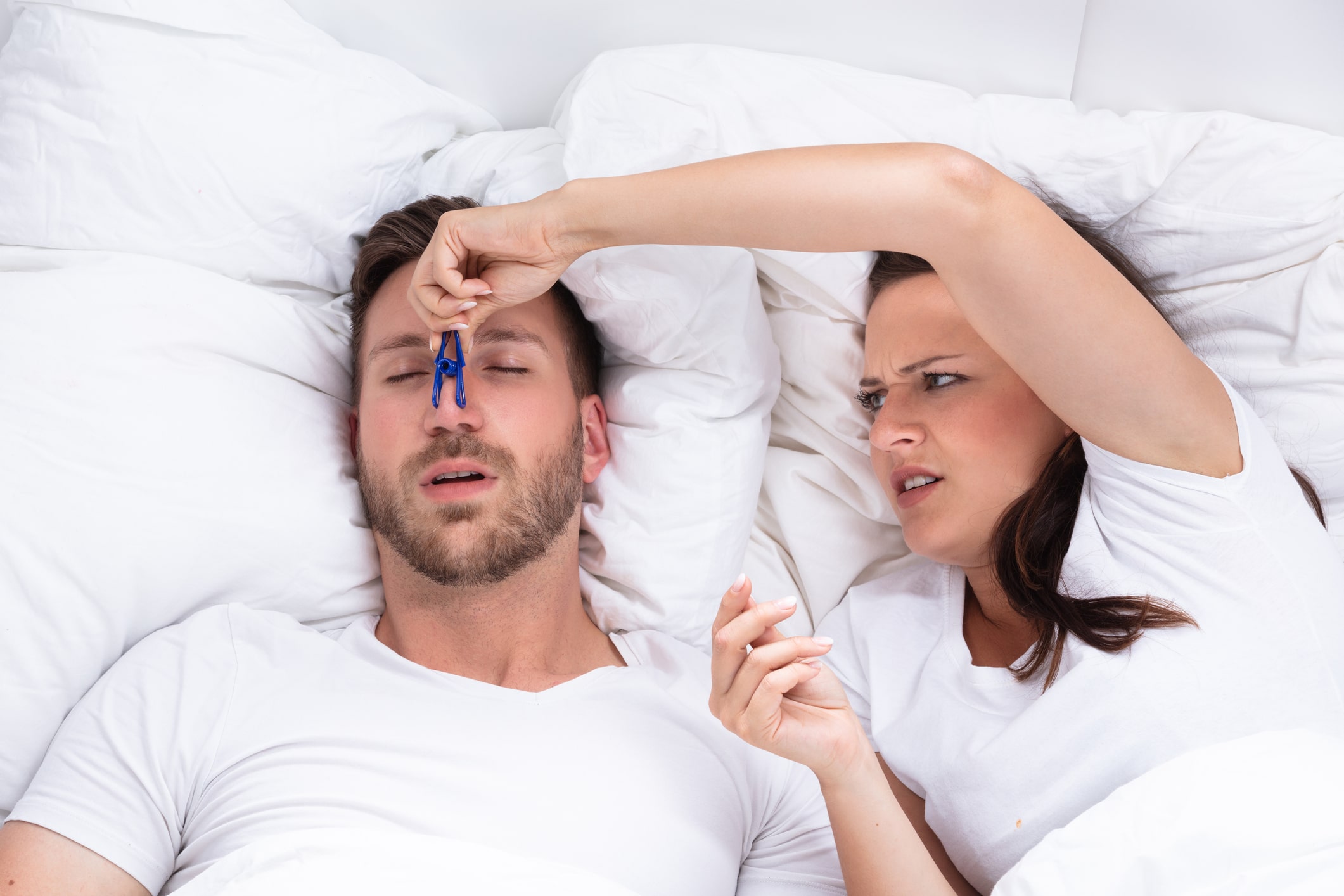
What causes snoring?
According to John Hopkins Medicine, it is estimated that 45% of adults snore occasionally, while 25% of adults snore regularly. Snoring occurs when airflow is obstructed through the passages at the back of the mouth and the nose. An obstruction narrows the airways leading to a vibration of muscles which causes the snoring sound. It can be caused by a variety of reasons. The intensity of snoring can vary nightly, depending on several contributing factors, which we will dive into below.
1. Does Sleeping Position Affect Snoring?
Everyone has a sleeping position that is most comfortable for them. But, did you know that some may increase the likelihood of you snoring while you sleep? Luckily this could be an easy switch to make to reduce snoring while you sleep.
If you sleep on your back it increases the likelihood of your tongue falling to the back of your throat blocking off your airway, which in turn will produce that vibrating sound when you breathe and air passes through.
Tips:
- Place extra pillows around your body to prevent rolling onto your back during sleep.
- Attach a tennis ball to the back of your pajama shirt, or place one under your pillowcase. The discomfort will encourage your body to roll back onto your side.
2. Can Clearing Your Nasal Passages Help?
If you are experiencing nasal congestion, your airways may be inflamed, which increases the chances that you will snore. Nasal irrigation can help to clear out mucus and allergens from your nasal passages and reduce inflammation.
Ways to clear your nasal passages:
- Saline or anti-allergy sprays
- Neti pot
- Nasal decongestants
3. Will a Humidifier at Night Reduce Snoring?
If your bedroom is dry, it can irritate your nasal passages and your throat, increasing your chances of snoring. Maintaining bedroom humidity between 30-50% helps to moisten your airways and reduce inflammation. If you live in a dry climate or use heating or air conditioning, a small bedside humidifier can make a big difference.
Tip: If you are prescribed and using a CPAP machine, using the humidification feature can also help reduce dry mouth or nasal congestion you may be experiencing.
4. Can Losing Weight Reduce Snoring?
If you are an individual living with obesity, you may have excess tissue around your neck and throat. This extra tissue can press on your airways while you sleep, leading to snoring during the night. You can reduce snoring frequency with modest weight loss and lifestyle modifications.
5. Does Alcohol Make Snoring Worse?
Alcohol and sedating medications can interfere with breathing because they have a relaxing effect on the body’s muscles, including the airway muscles. Relaxation of the airway muscles can cause obstruction, and therefore increases the likelihood of snoring.
Tip: Keep alcohol consumption to a minimum, especially prior to sleeping.
6. Will Quitting Smoking Help You Stop Snoring?
People who smoke are 2 times more likely to snore than individuals who don’t smoke. Smoking and nicotine may negatively affect your sleep. Nicotine is a stimulant, and when smoking close to bedtime, it can increase the chances that you will wake up in the night. Smoking irritates and inflames your airways, making them more narrow and restrictive for air to pass through. Quitting smoking can help reduce the severity of your snoring and help you sleep more restfully.
7. Do Nasal Strips Work for Snoring?
If you are someone who feels that they have narrowed nasal passages or obstruction in your nasal passages, nasal strips might be a good option to try. They help to open the nasal passage to promote airflow and reduce the risk of snoring throughout the night.
8. Will Treating Allergies Reduce Your Snoring?
Allergies can cause congestion and swelling in your nasal passages, and as mentioned before this can increase the likelihood of you snoring throughout the night. You can manage the severity of allergies by minimizing the exposure to allergens, staying hydrated, taking an antihistamine, or a nasal corticosteroid spray. By reducing the swelling in your nasal passages, you can help to reduce your snoring throughout the night.
Could Your Snoring Be A Sign of Sleep Apnea?
If you've tried these methods and still struggle with persistent snoring, you may have obstructive sleep apnea (OSA). OSA occurs when breathing repeatedly stops and starts throughout the night while someone is sleeping. This can lead to snoring, gasping for air, and microawakenings that someone might not even be aware of. There are many treatment options available for OSA and by working with a sleep clinician you can address your concerns and reduce your snoring.
You can assess your risk of sleep apnea by taking our sleep apnea quiz or book an appointment with a sleep clinician today to discuss your symptoms. Take control of your snoring today!
